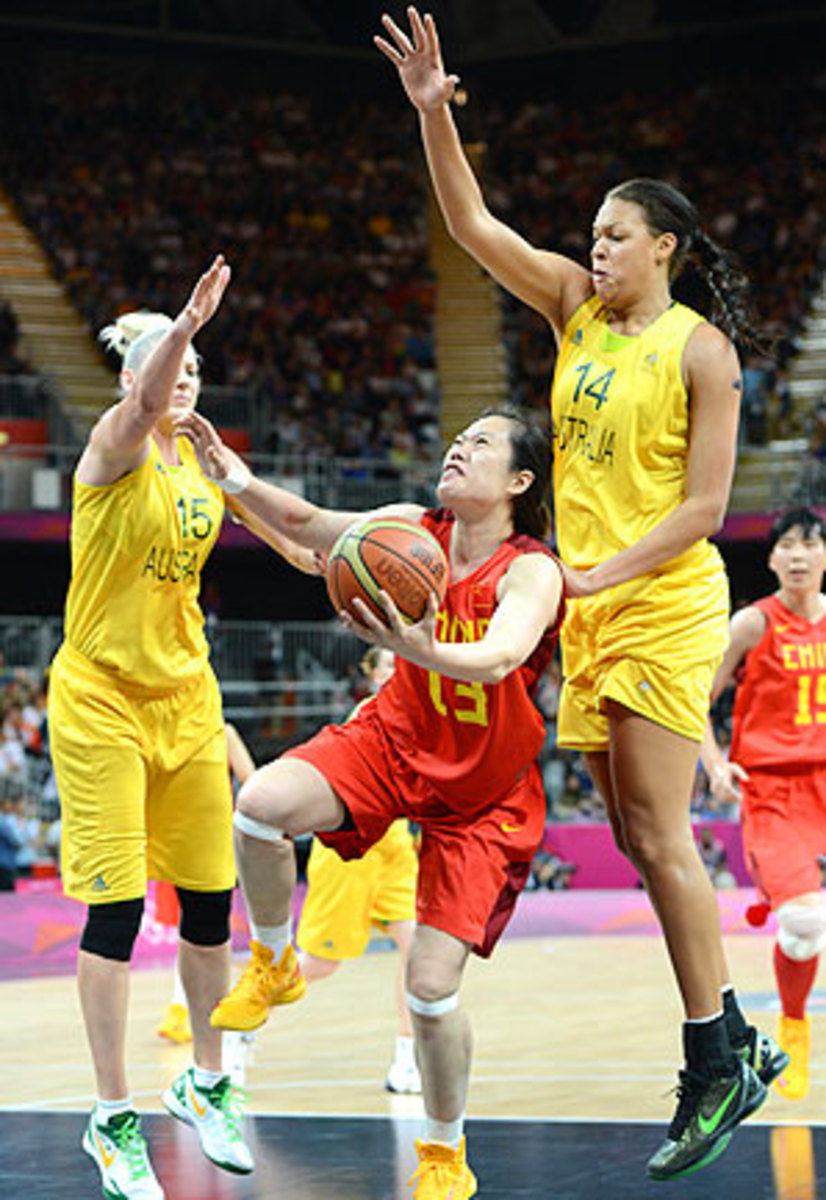U.S. must take down Aussies before playing for fifth straight gold medal
This year, thanks to Australia's overtime loss to France in pool play, the Opals get to face the USA one round early, in the semifinals Wednesday night, and the path to gold will be no easier through this route. Even without an offense that runs smoothly every night -- the US is making just 29% of its three-point shots -- the U.S. looks as dominant as it was in 2008. Through six games, the Americans have held opponents to just 32% shooting while beating them by 37.7 points a game, which is slightly better than the margin record the U.S. set in Beijing.
The Australian team in London is a little different than the one that lost by 27 to the US in Beijing: The Opals have added 6'8" Liz Cambage -- who scored what is believed to be the first-ever dunk in a women's Olympic game with a flush against Russia on August 5 -- to form a fearsome frontline that also includes the 6'5" Jackson and the 6'4" Suzy Batkovic. The three have combined to score 40 of the Opals' 71 points a game.
But Australia is missing a critical player in two-time Olympian Penny Taylor, a 6'1" forward who blew out an ACL in a Euroleague game in March.
"That's a huge loss," says U.S. point guard Sue Bird. "Penny in her own right is one of the best players in the world. The thing about her in the Olympics that makes her so difficult is just how different she is. The way she can shoot the ball, the way she can create off the dribble; at times it's almost impossible to guard her when she gets it going. That was always the big difference for that Australia team. You had Lauren. Then you had the Penny problem."
While there is no Penny problem this year, other challenges for the U.S. loom. "Australia poses the same challenges for us that they pose for everybody else," says U.S. coach Geno Auriemma. "They're big and they're physical and they're experienced, they know each other very well. They are unbelievable disciplined in what they do. It's a problem that every team that plays Australia has: how do you combat their size?"
In the quarterfinal on Tuesday, China couldn't do it: The Aussie Big 3 eventually wore the Chinese down, combining to score 29 points and grab 20 rebounds.
In 6'4" Candace Parker, 6'4" Tina Charles and 6'5" Sylvia Fowles, who scored 12 points in 8 ½ minutes against Canada despite a sore knee, the U.S. has a frontline that can match up with Australia in most respects. But nobody on the U.S. team has the size of Cambage, an Olympic rookie.
"Cambage is the biggest person in this tournament," says Auriemma. "Once she catches the ball where she wants it, there's not much you can do about it. So we've got to work really, really hard at getting her into the spots where she's not comfortable. That's going to be a big key. It's all about us making them uncomfortable. And they're going to make us uncomfortable, believe me. They punch you, they grab you, they are the most physical team in the tournament."
While the Aussies may have a slight edge in the paint, the Americans should have an advantage in their guards: Bird, Diana Taurasi and Olympic rookie Lindsay Whalen. Those three set the tone for sharing and taking care of the ball, two hallmarks of the US team. Through six games, the US has posted 147 assists (on 223 total baskets) against 87 turnovers. "That's remarkable," says Auriemma. "I don't know that that's ever happened."
Two other big strengths for the U.S. are defense and depth. "We're operating on a lot of good cylinders, but that could change tomorrow," says Auriemma. "It's all about making shots in the Olympics, because every other team is good offensively. You have to be just as good offensively and better defensively."
It's Auriemma's job to find things to fret about, but at least one vanquished opponent thinks he need not to bother as the U.S. aims for its fifth straight gold medal.
"You can tell [the U.S. is] on a mission, and I think they are going to run away with this tournament," Canada forward Lizanne Murphy said her team's quarterfinal loss to the US on Tuesday. "I don't think anyone is really going to give them a challenge. They are just too physical inside and too deep and too good at every position."





